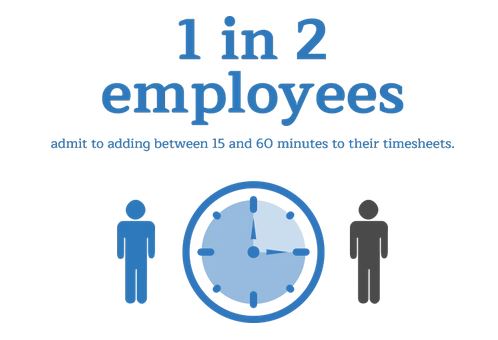
If you have employees, you probably spend more time with them than your own family.
That being said, you want to do everything in your power to build respectful relationships with them, giving them as much compassion and empathy as you can, otherwise, you’re going to end up driving each other nuts.
But when you’re dealing with something like time theft, you have to find a balance between maintaining those kinds of relationships and dealing with the realities of running a profitable business.
Nobody wants to be the hard-ass that everyone tries to avoid, but you can’t just ignore this kind of misconduct either.
Employees showing up to work five minutes late or leaving five minutes early might not seem like a big deal, and you may be inclined to look the other way on this sort of thing, but if you consider this from a cumulative perspective, it’s actually a huge issue.
And as much as you may want to give the same implicit trust to your employees that you would your own family, the truth is, that’s probably not a good idea.
For instance, according to an article from QuickBooks, in a survey of 1,000 employees, 49 percent admitted to committing time theft, which means one in two employees is stealing company time.

Putting things in even greater perspective, the article points out that if 49 percent of hourly employees in the U.S. added only 15 minutes per week to their timesheets, the total cost to U.S. employers would be over $11 billion per year.
With that in mind, I wanted to publish an article exploring this issue, and offering some practical advice on what employers like you can do about it.
So, if your employees are stealing time at work, you suspect that they are, or you want to learn how to prevent time theft before it happens, then this is an article you’re not going to want to miss.
What Is Time Theft?

You may already know what this term means, but for the sake of clarity, I want to provide a definition and explore the various ways that employees can commit time theft.
Simply put, time theft is when employees accept payment for hours they did not actually work, which can include many different behaviors, such as:
- Buddy punching (employees clocking in for each other when they’re absent)
- Arriving late or leaving early without adjusting hours accordingly
- Engaging in personal activities during work hours
- Taking longer breaks than are allowed
- Working unauthorized overtime
It’s also important to point out that time theft is not always intentional, and misunderstandings and mistakes do happen, so don’t assume every employee who engages in this behavior is out to get you.
But regardless of why they do it, and even if it was somehow an accident, these behaviors constitute serious misconduct, and employees need to know that this sort of thing will not be tolerated.
Because no matter why your employees are engaging in this kind of behavior, it’s going to significantly increase your payroll costs, and regardless of how you slice it, that’s not good for your business.
How to Prevent Time Theft

Time theft is a serious issue for employers, as it can result in lost productivity, significantly increased labor costs, and decreased morale for employees who work diligently, among other consequences.
That being said, if you want to prevent time theft while fostering a culture of accountability, integrity, and productivity in your workplace, here’s what you can do:
Phone Policies
This is more like something you should avoid doing, but I figured I would include it anyway because I see this way too often and it just doesn’t work.
A lot of employers like to outright ban phones during work hours, as they see this as a way to stop employees from getting distracted or taking care of personal matters during work hours.
But I don’t like the idea of doing this, unless it’s strictly for safety reasons, because as far as I’m concerned, it’s just going way too far.
Yes, employees should know that personal matters should be taken care of outside of work hours unless it’s absolutely necessary, but sometimes, people have to take or make calls during work hours, and if you try to prevent that entirely, you’re just giving your employees another excuse to steal time.
Clear Expectations and Policies
If you want to prevent time theft, establishing clear expectations regarding work hours, breaks, and timekeeping policies is essential.
You should also ensure all employees understand what constitutes time theft, that they’re well aware of the consequences of this kind of behavior, and that they understand the importance of honest time reporting and the impact time theft can have on the business.
In addition, you should provide written policies outlining attendance requirements, break times, and timekeeping procedures, preferably in your employee handbook, and make sure someone sits down with new employees and goes through it with them, emphasizing the sections on time theft.
Effective Communication
You should regularly communicate with employees about the importance of accurate timekeeping and the consequences of time theft, especially if this is an ongoing issue for your business.
It’s also a good idea to encourage employees to feel comfortable discussing any concerns they have about their workload or work schedule, as this can help to assuage any resentment and dissuade them from engaging in any dishonest behavior.
But your employees also need to understand that their time should be used efficiently, so unless it’s an emergency, rather than coming to your office every time they have an issue, it’s better for them to take notes on everything and then talk to you about it all in one meeting, if possible.
Use of Technology
Implementing time-tracking software or biometric systems can help monitor employee attendance and work hours accurately.
These systems can track when employees clock in and out, record break times, and stop unauthorized overtime, which can help prevent time theft by eliminating the ability for employees to be dishonest through things like paper timesheets.
Regular Monitoring and Auditing
Conducting regular audits of employees’ time records is another good thing to do, as it can help you identify any discrepancies or patterns of time theft that are occurring.
If you do find anything fishy with employees’ work patterns, make sure to address any anomalies promptly, and you can also utilize software tools to analyze time data for any inconsistencies.
Flexibility and Trust
Building a culture of trust and accountability where employees feel valued and respected can make it less likely that employees will want to engage in dishonest behavior.
Offering flexible work arrangements, for example, such as telecommuting or flexible hours, can help to accommodate employees’ needs, reducing their temptation for time theft.
Recognition and Incentives
Whether you give them a gift card, offer them a paid day off, take them out to lunch, or something else entirely, you should make a point of recognizing and rewarding employees who consistently adhere to company policies and demonstrate integrity in their timekeeping.
This can help motivate all your employees to prioritize productivity and efficiency.
Consequences for Violations
Your employee handbook should clearly outline the consequences for time theft, and new employees need to be made aware of this right away.
If anyone does get caught stealing company time, make sure to consistently enforce the consequences of these violations.
Disciplinary actions may include verbal warnings, written reprimands, suspension, or termination, depending on the severity of the offense.
Lead by Example
As the owner of your business, no one can tell you what to do with your time, and employees shouldn’t be particularly concerned with what you’re doing anyway.
But your managers and supervisors should lead by example by strictly adhering to company policies regarding timekeeping and demonstrating integrity in their work habits.
Because when employees see that their superiors value punctuality and honesty, they are more likely to follow suit, and if they don’t see this going on, then it’s just one more excuse for them to steal time.
Regular Performance Reviews
During employee performance reviews, you should include discussions about time management and adherence to company policies, especially when there’s been a discrepancy with an employee’s hours.
But, as I mentioned above, this sort of thing isn’t always intentional, so make sure to provide constructive feedback and support to help employees improve their time management skills, if need be.
And before any reviews can take place, you should set specific KPIs for every employee, and let them know what those are, so they’re fully aware of everything that’s expected of them and there’s no plausible deniability.
Employee Feedback Mechanisms
Another thing you can do is implement systems for employees to provide feedback anonymously regarding any concerns they have about time theft or other workplace issues, as this can help to build employee trust and improve morale.
When concerns are brought up, make sure to address them promptly, but keep in mind that it’s best to just let employees know that these systems are there, rather than encouraging them to snitch or be suspicious of their fellow employees, as this can cause a whole new list of problems.
Time Studies
A time study involves systematically observing and recording the time taken to complete specific tasks or activities.
This tool enables employers to measure employee productivity more accurately, detect any instances of time theft or unauthorized breaks, compare actual work time against reported hours, identify discrepancies, and address them promptly.
What’s more, a time study can also help when employees aren’t intentionally stealing time, and just need some help with time management, as it can help them identify their biggest time wasters.
Are you dealing with issues related to time theft? Contact me today to find out how I can help.
Productivity, Team Management, Time Management